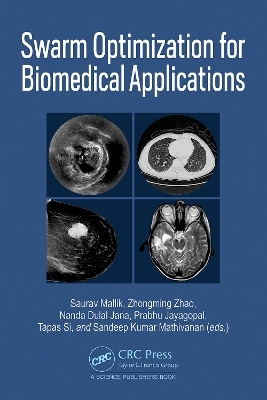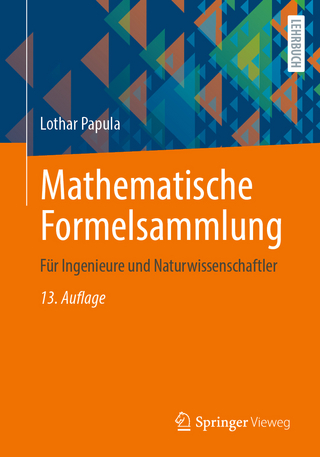
Swarm Optimization for Biomedical Applications
CRC Press (Verlag)
9781032697338 (ISBN)
Biomedical engineering is a rapidly growing interdisciplinary area that is providing solutions to biological and medical problems and improving the healthcare system. It is connected to various applications like protein structure prediction, computer-aided drug design, and computerized medical diagnosis based on image and signal data, which accomplish low-cost, accurate, and reliable solutions for improving healthcare services. With the recent advancements, machine learning (ML) and deep learning (DL) techniques are widely used in biomedical engineering to develop intelligent decision-making healthcare systems in real-time. However, accuracy and reliability in model performance can be a concern in tackling data generated from medical images and signals, making it challenging for researchers and practitioners. Therefore, optimized models can produce quality healthcare services to handle the complexities involved in biomedical research.
Various optimization techniques have been employed to optimize parameters, hyper-parameters, and architectural information of ML/DL models explicitly applied to biological, medical, and signal data. The swarm intelligence approach has the potential to solve complex non-linear optimization problems. It mimics the collective behavior of social swarms such as ant colonies, honey bees, and bird flocks. The cooperative nature of swarms can search global settings of ML/DL models, which efficiently provide the solution to biomedical engineering applications. Finally, the book aims to provide the utility of swarm optimization and similar optimization techniques to design ML/DL models to improve the solutions related to biomedical engineering.
Dr Saurav Mallik is a Research Scientist in the Department of Pharmacology and Toxicology, The University of Arizona, USA. Prior to this, he was a Postdoctoral Fellow in the Department of Environmental Health, Harvard T H Chan School of Public Health, Boston, USA (2019-2022), the Center of Precision Health, Department of School of Biomedical Informatics, University of Texas Health Science Center at Houston, Houston, Texas, USA (2018-2019), and in the Division of Bio-statistics, Department of Public Health Sciences, University of Miami Miller School of Medicine, Miami, Florida, USA (2017-2018). He obtained a PhD degree in the Department of Computer Science & Engineering (CSE) from Jadavpur University, Kolkata, India in 2017 while his PhD works carried out in Machine Intelligence Unit, Indian Statistical Institute (ISI), Kolkata, India. He worked previously at ISI, Kolkata, India as a Junior Research Fellow (JRF) in DST (Department of Science & Technology, New Delhi, Government of India) sponsored project and as a Visiting Scientist during 2011-2013 & 2015-2016. He also worked in the Department of Computer Science & Engineering, Jadavpur University, Kolkata, India as a University Grant Commission, Government of India, Research Fellow during 2014-2015 & 2016-2017. He is the recipient of Research Associateship from Council of Scientific and Industrial Research, MHRD, Government of India in 2017. He is also recipient of "Emerging Researcher In Bioinformatics" award from Bioclues & BIRD Award steering committee, India (http://bioclues.org/) in the year 2020 and "Young scientist award" on “International Scientist Awards on Engineering, Science and Medicine" (ISAO 2021) in the year 2021. He received two times Travel Grant Award for International Conference on Intelligent Biology and Medicine (ICIBM), at Los Angeles, California, USA (2018) and at Philadelphia, PA, USA (2021). Dr Mallik has coauthored more than 190 research papers (cited by >2,000 times, h-index = 24) in various peer-reviewed International Journals, Conferences and Book Chapters. He also has an edited book publication in Chapman and Hall/CRC, Routledge, Taylor & Francis Group. He attended many national and international conferences in USA and India. He is currently an active member of Institute of Electrical and Electronics Engineers (IEEE), American Association for Cancer Research (AACR), and Association for Computing Machinery (ACM), USA and life member of BIOCLUES, India (http://bioclues.org/). He is editors of many journals like Frontiers in Genetics, BMC Bioinformatics, Frontiers in Bioinformatics, Archives of Medical Sciences, Mathematics (MDPI), Electronics (MDPI), Bioengineered (Taylor & Francis), Artificial Intelligence with Applications, Genetics and Molecular Medicine and many more. He is also member of international advisory committee of many reputed engineering colleges in India. His research areas include Data mining, computational biology, bioinformatics, Bio-statistics and machine learning. Website: https://sites.google.com/site/chasauravmallik786/?pli=1; https://scholar.harvard.edu/saurav-mallik/bio Prof. Zhongming Zhao, PhD, MS is a professor at McWilliams School of Biomedical Informatics at UTHealth Houston, formerly UTHealth Houston School of Biomedical Informatics (SBMI) and appointed as the Chair for Precision Health. He is the founding director of the Center for Precision Health, which is a joint venture between McWilliams School of Biomedical Informatics and the UTHealth School of Public Health. Before coming to UTHealth, Zhao was a tenured professor in the Departments of Biomedical Informatics, Psychiatry and Cancer Biology at Vanderbilt University School of Medicine and held Ingram Professorship of Cancer Research. He also served as the chief bioinformatics officer of the Vanderbilt-Ingram Cancer Center (VICC), the director of the VICC Bioinformatics Resource Center, director of the Bioinformatics and Systems Medicine Laboratory and the associate director of the Vanderbilt Center for Quantitative Sciences. Zhao is a member of numerous organizations including the American Medical Informatics Association (AMIA), the Institute of Electrical and Electronics Engineers (IEEE) and the American Society of Human Genetics (ASHG). He has more than 24 years of bioinformatics, genomics, machine learning/AI, and pharmacogenomics research experience, collaborated with more than 100 investigators, and has authored/co-authored more than 450 papers (cited by >21,000 times, h-index = 75). His work has been supported by more than 50 funded grants totaling more than $100 million. Dr. Zhao was elected as a fellow in the American College of Medical Informatics (ACMI), the American Medical Informatics Association (FAMIA), and the American Institute for Medical and Biological Engineering (AIMBE). Website: Zhongming Zhao - Faculty & Staff - McWilliams School of Biomedical Informatics at UTHealth Houston Dr Nanda Dulal Jana has a BSc in Mathematics (Hons), BTech and MTech in Computer Science & Engineering from University of Calcutta, India in 2001, 2004 and 2006. He received PhD from Computer Science Technology Department of IIEST Shibpur, India in 2017. He is an Assistant Professor in Computer Science & Engineering Department of National Institute of Technology Durgapur. He has authored/co-authored more than 50 technical articles in journals and conferences. Dr Jana’s key research interests include Metaheuristic Optimization Techniques, Evolutionary Machine Learning, Deep Learning and their applications to Protein Structure Prediction, Computer Aided Drug Design, Image Classifications, EEG Signal Classifications and Speech Synthesis. Website: https://scholar.google.com/citations?user=69EVBBsAAAAJ&hl=tl Dr Prabhu Jayagopal received his Bachelor’s degree in Information Technology from the University of Madras Under Vellore Engineering College, Vellore, India (2004), the master’s degree in Computer science and engineering from Sathyabama University, Chennai, India (2007), and the PhD degree in Computer Science and Engineering from Sathyabama University, Chennai, India (2015). He is having an Academic experience of above 15 years. Now he is currently working as an Associate Professor senior in School of Information Technology and Engineering, Vellore Institute of Technology, Vellore from 2009 to till date, He has published more than 65 papers in National, International journals and conferences. He is also involved in collaborative research projects with various national and international level organizations and research institutions. His Research interests are software testing, Machine Learning, IoT, Deep Learning, Block Chain and Big data. Website: https://betativ.irins.org/profile/190606#personal_information_panel https://scholar.google.com/citations?user=6-4F8SsAAAAJ&hl=en Dr Tapas Si received the B.Tech. degree in computer science and engineering from Maulana Abul Kalam Azad University (formerly West Bengal University of Technology), and the M. Tech. degree in information technology and the Ph.D. degree in engineering from the National Institute of Technology Durgapur, West Bengal, India. He is currently a Professor at the Department of Computer Science and Engineering, University of Engineering and Management, Jaipur, Rajasthan, India. He has published 80 papers in reputed international journals/conferences. His research interests include machine learning, swarm intelligence, medical image processing, and medical data mining. He is a member of the Institute of Engineers, India; the Soft Computing Research Society; and the Machine Intelligence Research Laboratories, USA. He serves as a reviewer for Springer, Elsevier, and IEEE journals. He is listed in Who’s Who in the World, in 2016 and 2020, and Marquis’s Who’s Who in the USA. Website: https://scholar.google.co.in/citations?hl=en&user=c3p37lQAAAAJ&view_op=list_works&sortby=pubdate Dr Sandeep Kumar Mathivanan is working as Assistant Professor in the School of Computer Science and Engineering, Galgotias University, Greater Noida, Uttar Pradesh, India. He received his M.S degree in Software engineering from the Vellore Institute of Technology (VIT), Vellore, India, in 2016, and the M. Tech (By Research) degree from Vellore Institute of Technology (VIT), Vellore, India, in 2020 and Ph. D degree in School of Information technology and Engineering from Vellore Institute of Technology (VIT), Vellore, India, in 2023. He has more than 7 years of research experience and 1.5 years of teaching experience. He has published more than 50+ papers in international journals and conferences. He is also involved in collaborative research projects with various national and international level organizations and research institutions. He is reviewer in many reputed journal like Heliyon, Multimedia tools ,Soft computing, Transactions on Consumer Electronics, Optical and Quantum Electronics International journal of end-user computing and development, International journal of speech technology, International journal of system assurance engineering and management, Network modeling analysis in health informatics and bioinformatics, Progress in artificial intelligence, Computers in Biology and Medicine Computers and Electrical Engineering and Wireless personal communications. His current research interests include Machine Learning, Deep Learning, Remote sensing, big data. Website: https://scholar.google.com/citations?user=36CgiLkAAAAJ&hl=en
Preface. Introduction. 1. A Swarm Intelligence Optimization for Lung Cancer Detection from RNA-Seq Gene Expression Data Using Convolutional Neural Networks. 2. A Comprehensive Review on Optimization Algorithms and Applications for Medical Imaging Data. 3. A Comprehensive Analysis of Auto Carrier Loading and Cargo Space Optimization for a Specific Type of Container Using GA. 4. Classification of Heart Disease by Using Particle Swarm Optimization for Hyperparameter Tuning of Machine Learning Models. 5. Mathematical Model for Swarm Optimization in Multimodal Biomedical Images. 6. Swarm Intelligence in Lung Cancer Detection and IoT-Enabled Data Transmission: A Technological Approach. 7. Radiant Insights: Unveiling the Future of Cancer Diagnosis through DOTA-NOC and PET-CT Algorithmic Synergy. 8. Swarm-Optimized Pancreatic Precision: Comprehensive Early Detection through Endoscopic Ultrasound Data Analysis. 9. An Overview of Optimization Techniques for Pre-processing of RNA-seq Data. 10. Improved GA based Clustering with a New Selection Method for Categorical Dental Data. 11. DeepExuDetectNet: Diabetic Retinopathy Diagnosis: Blood Vessel Segmentation and Exudates Disease Detection in Fundus Images. 12. Analysis of Human Emotions with Bio-signals (EEG) using Deep CNN. 13. Supervised GAN (SGAN): Method and Application on Labelled Genomic/Epigenomic Data. 14. A Lightweight Attention-based Convolutional Neural Network for Classification of 3D Biomedical Images. 15. Predictive Security Architecture for Securing Medical Images in Cloud Based IoT. Index.
| Erscheinungsdatum | 04.01.2025 |
|---|---|
| Zusatzinfo | 6 Line drawings, color; 42 Line drawings, black and white; 2 Halftones, color; 41 Halftones, black and white; 8 Illustrations, color; 83 Illustrations, black and white |
| Verlagsort | London |
| Sprache | englisch |
| Maße | 156 x 234 mm |
| Gewicht | 700 g |
| Themenwelt | Mathematik / Informatik ► Mathematik ► Angewandte Mathematik |
| Mathematik / Informatik ► Mathematik ► Finanz- / Wirtschaftsmathematik | |
| ISBN-13 | 9781032697338 / 9781032697338 |
| Zustand | Neuware |
| Informationen gemäß Produktsicherheitsverordnung (GPSR) | |
| Haben Sie eine Frage zum Produkt? |
aus dem Bereich


